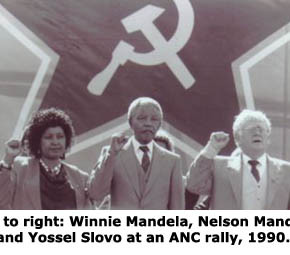Chris Hani. SACP leader
In 1960 the African National Congress and Pan Africanist Congress were also banned, and went into exile. In November of 1961 some SACP and ANC members managed to meet in secret the Kwazulu Natal area. The party’s decided to turn to an armed struggle and they launched Umkhonto we Sizwe (MK), a military branch separate from the ANC, to be led by the ANC and the SACP. In December 1961 MK exploded the first homemade bombs in a two-year sabototage campaign. Intended a a last resort ‘to bring the government to its senses’, the bombs were targeted against property, not lives.
The relationship between the ANC and the SACP in the 1960s was not always a close one. In fact after 1962 Nelson Mandela began playing down the ANC’s relationship with the SACP when he returned from a trip through Africa, as African leaders were puzzled by the ANC’s association with the SACP.
But along with the ANC, the SACP faced the same forms of suppression and infiltration in the 1960s. After the Lilliesleaf Farm Raid and Operation Mayibuye plans it was prominent SACP member Bram Fischer that defended those arrested as their lawyer in the infamous Rivonia Trial. He was eventually also tried and in 1965 sentenced to life imprisonment.
In 1969, immediately after the Morogoro conference the ANC and SACP met formally to discuss working together. Over the coming years they worked closely with the SACP bringing the experience of being underground for two decades to the table. During these years there were hadly any significant differences between the ANC and SACP, and many leaders were members of both organisations.
There were however some within the ANC who remained sceptical about working with the SACP and about relations with the USSR. They were particularly concerned with the fact that other western countries would withdraw support as a result of links with communism. These members did sometimes cause conflict, but it was also during this period that both organisations began to grow in stature and increased their activity among the oppressed people.
The SACP and ANC remained banned until 1990, and soon after being unbanned decided to give up the armed struggle in the period of negotiation. Chris Hani, SACP Secretary-General and MK leader, played a very important role in negotiation and in convincing more impatient people that negotiation was the best way, until he was murdered in 1993. Negotiations focused more on democracy than on communism or socialism, and a mixed economy was supported. Negotiations included a wide range of people by the end of 1991, in the form of the Convention for a Democratic South Africa (CODESA).
The SACP continued to play an important role in the early 1990s, usually with the ANC, and in the Government of National Unity. A Tri-party Alliance was formed between the SACP, the ANC and COSATU, which continues to this day.


